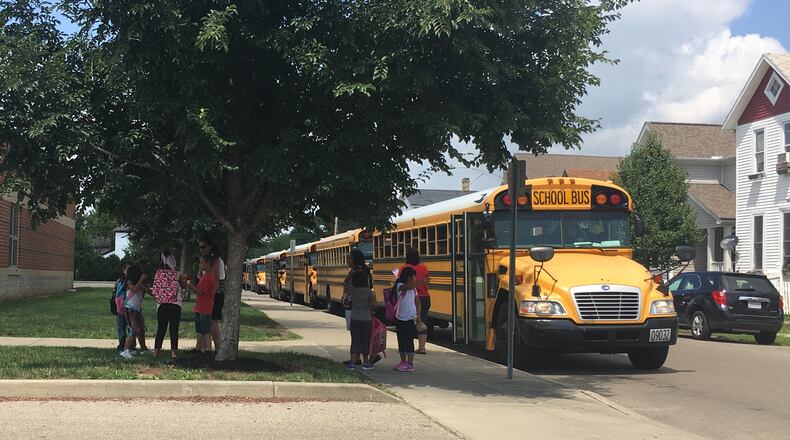The first day of school for DPS students is Aug. 15.
Here’s what you need to know about the current contract stalemate:
» RELATED: DPS teachers say strike a real possibility in August
Who’s involved?
The Dayton Education Association and Dayton Public Schools are negotiating.
The DEA represents the nearly 1,100 professional educators employed by Dayton Public Schools, including teachers, counselors, media specialists and therapists. The DEA is affiliated with the Ohio Education Association and the National Education Association.
Dayton Public Schools is one of the Ohio 8 districts, the largest urban public school districts statewide. Superintendent Rhonda Corr is leading a completely revamped DPS administration trying to put its stamp on the struggling district.
More than 13,000 students depend on DPS and its teachers for their education.
» RELATED: Dayton earns ‘A’ on report card, ends takeover threat
What’s the problem?
With the current contract expiring on June 30, the two sides have been negotiating since Jan. 6, while using a mediator since May 4. There were 241 new proposals brought by the school board in this year’s bargaining, which, “in and of itself is unusual and unreasonable,” DEA President David Romick said in May.
That number of proposals is down to less than 20, Corr said on Tuesday. Union officials, however, put the number of remaining issues at 20 to 30.
Romick specified Wednesday that the priority issues remaining on the table include “salary, benefits, our school day, the time clock and employee transfer language.” The school day issue could be especially pressing as the district plans to change start and finish times for many schools next fall to make their busing operation work better.
» RELATED: How much do teachers make in your district?
Where do they stand?
Corr recently noted the “great progress” that the two sides have made in negotiations, given the number of proposals up for discussion. But Romick said on Tuesday that DPS is still “in crisis.”
“The Board has failed to compromise with Dayton teachers repeatedly,” Romick said. “As educators, we are seriously concerned about student learning conditions, and are fearful that the continued lack of leadership at Dayton Public Schools have forced negotiations closer to the start of the school year, placing an on-time return to school in jeopardy.”
Corr said negotiations have the highest priority.
“It’s our greatest hope to start the year with our teachers,” she said. “We want a fair contract. It’s our greatest desire to get back at the table and be able to negotiate this so we can start the school year off in a positive and normal fashion.”
» RELATED: Dayton school board postpones planned layoffs
Is teacher pay a big issue?
Yes. Dayton teachers’ starting salary is comparable to many of the surrounding districts, but by Year 10, the Dayton teacher is making about $5,000 per year less than teachers at the area’s large suburban districts.
The maximum salaries for end-of-career teachers in Dayton are $15,000 to $20,000 per year less than Beavercreek, Centerville and Kettering. That affects DPS’ ability to recruit and retain teachers.
» RELATED: Ohio graduation system changes explained
How long until this gets resolved?
With mediated talks suspended for June and July, the two sides will be cutting it close if they want to resolve the remaining issues by Aug. 15, the district’s first day of school.
The union has given its leadership the nod to issue a strike notice if necessary, and they have a meeting scheduled Aug. 1 during which they could issue a 10-day strike notice. In May, union officials called the possibility of a strike in August “very real.” Teachers have been holding up “No contract = no work” signs at school board meetings and other events.
However, DPS teachers have started the school year working under an expired contract before. In 2013, when DPS teachers’ last contract expired, no deal was reached in the summer and they worked into the next school year under the terms of an expired contract. A new agreement was finally signed in December 2013.
Romick said that is possible, but he’s less optimistic than he was last month, given the stalemate.

